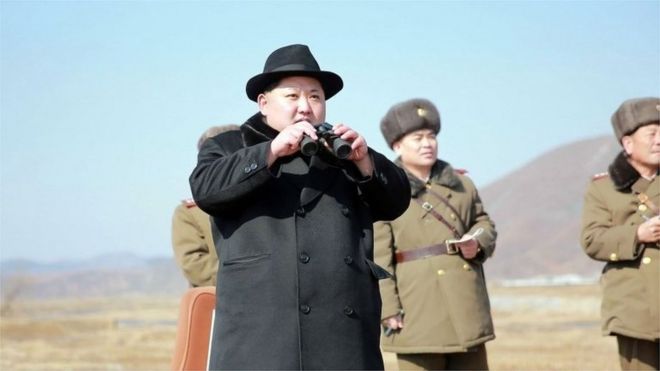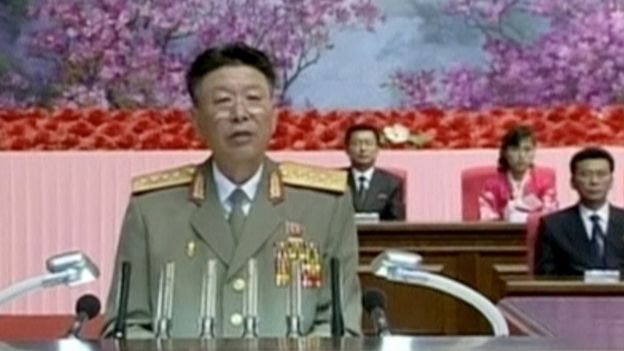
Ri Myong-su has been named army chief in North Korea, days after unconfirmed reports that his predecessor, Ri Yong-gil, had been executed.
State news agency KCNA mentioned his new role in its reporting on activities of North Korean leader Kim Jong-un.
Several high-ranking officials have been purged under Mr Kim, but Ri Yong-gil's removal is unconfirmed.
However, senior officials in North Korea have previously been absent from view for long periods only to reappear.
South Korean media reported on 10 February that Gen Ri had been executed earlier this month for corruption and "factional conspiracy".
 Reuters
ReutersWho is Ri Yong-gil?
- Previously presented by state media as a key figure in Kim Jong-un's entourage
- First emerged as a senior staff officer in 2012 before taking over as chief of staff
- Last seen in early January alongside Mr Kim during the North's latest nuclear test
Who was N Korea's 'executed' general?
Rumours that Gen Ri had fallen from favour first surfaced late last year. Gen Ri Myong-su had also appeared at a recent rally in Pyongyang and been mentioned in the slot normally reserved for the chief of staff.
On Sunday, the KCNA mentioned Gen Ri Myong-su twice - once describing him as "chief of the Korean People's Army (KPA) General Staff" whilst reporting on Kim Jong-un's observation of aerial manoeuvres, and again when accompanying Mr Kim during a flight drill inspection.
He appears to be the fourth chief of staff since Kim Jong-un took over in 2011, as opposed to three during his father Kim Jong-il's 17 years in power.
The reports of Gen Ri's execution came days after the North launched a long-range rocket, which critics say is a test of banned missile technology.
In January the North carried out its fourth nuclear test.
Some observers say the regime's recent behaviour may be linked to Kim Jong-un wanting to shore up his position ahead of a rare congress of the Workers' Party due in May.
In May 2015 South Korea's spy agency told parliament that the North's Defence Minister Hyon Yong-chol had been executed for showing disloyalty to Mr Kim.
The agency said Mr Hyon was killed by anti-aircraft fire in front of an audience of hundreds - it later said it was yet to verify the information. That news came weeks after the reported execution of 15 senior officials.
Analysis from the BBC's Stephen Evans in Seoul
North Korea rarely confirms these reports of purges and executions though it did announce the death of Kim Jong-un's uncle and mentor, Chang Song-thaek, in 2013.
Sometimes reports become completely fanciful as they spin around the internet - reports that Mr Chang was devoured by ravenous dogs were false.
Knowing what to make of the executions and disappearances is also hard. Do they indicate the strength of the man at the top, because he can arbitrarily and brutally dispense with the people around him, or does it indicate weakness?
It may be both. It may be that Kim Jong-un fears alternative sources of power and (like Stalin) pre-empts their rise. But it may also be that Kim Jong-un (like Stalin) sees threats where they do not exist. What is clear is that the leadership around Kim Jong-un is not stable.
No comments:
Post a Comment